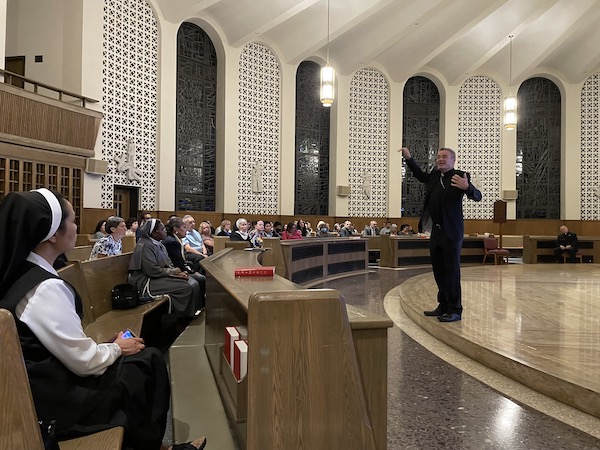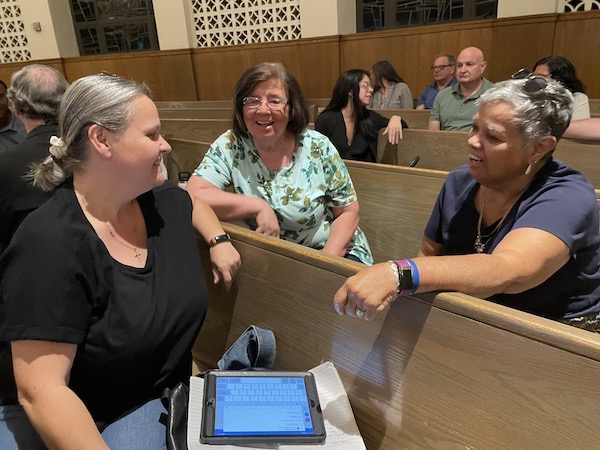
DOUGLASTON — Laying the groundwork for a future overhaul of faith formation in the Diocese of Brooklyn, Bishop Robert Brennan gathered catechetical leaders together for a summit at the Immaculate Conception Center in Douglaston on Sept. 21.
While no definitive plans were announced at the summit, it was made clear by both Bishop Brennan and Father Joseph Gibino, vicar for evangelization and catechesis and the moderator of the summit, that major changes are likely coming.
“The education model we used for the past 200 years no longer works. We need a new model,” Father Gibino said to approximately 40 faith formation leaders, educators, and pastors in attendance.
Faith formation includes preparing children for the sacraments of Communion and confirmation.
The current model, in which parents drop children off for classes and leave, will probably give way to a system where whole families become part of faith formation, Father Gibino said.
Under a new model, parishes will be encouraged to collaborate with each other. This is necessary, Bishop Brennan said, because enrollment differs sharply from parish to parish — with some churches boasting large numbers while others are barely getting by.
“You see the population growing here and shrinking there. The realities are different,” he explained.
Faith formation leaders took in the information with an eye toward helping the diocese move forward.
Ivonne Rodriguez, director of religious education at Immaculate Conception Parish in Jamaica Estates, said her parish is used to change since it adapts its faith formation program to reflect changing demographics. “We have faith formation in several different languages,” she added.
The diocese is determined to develop a faith formation model that reflects the church’s understanding of the realities of people’s daily lives — single parent homes, grandparents raising grandchildren, economic concerns, and other factors — Bishop Brennan explained. “We have to meet people where they are,” he added.
Bishop Brennan said he doesn’t have a specific timetable, but the future of faith formation will be discussed when he meets with the diocese’s priests at the fall convocation at the Immaculate Conception Center on Wednesday, Sept. 27.
As a first step, Bishop Bennan will ask for a realistic assessment of the state of faith formation programs in each of the diocese’s deaneries. And he wants feedback from lay leaders. “We will start looking at bringing people in as part of the conversation,” he explained.

The coming changes stem partly from the results of the diocese’s recent synod process, in which Catholics candidly expressed their hopes and concerns for the Church. One concern parishioners expressed, Father Gibino said, is that the Church needs to better address the needs of children and young adults.
The diocese will be facing troubling headwinds as it revamps its faith formation program. According to a Pew Research Center study, 29% of people in the U.S. are so-called “nones,” people who do not practice any faith.
In his presentation, Father Gibino cited other data from a different Pew Research study that found over 30% of Catholics in the U.S. are between the ages of 51 and 65.
Catholics are more likely to be older, Hispanic, hold fewer advanced degrees, and earn mid-level incomes, the study reported.
Other studies found a significant dropoff in church attendance and parish participation after adolescents are confirmed, usually in the eighth grade. More troubling is a dropoff taking place much earlier — after Communion, when a child is typically only 7 years old.
In another development, adherence to the faith is often something that skips generations, according to faith formation leaders, who said they’re seeing lots of grandparents bringing their grandchildren to classes because the children’s parents do not prioritize faith formation.
There is data to back this up. A Pew Research poll released in January found that only 35% of Catholic parents in the U.S. believe it’s extremely important that their children belong to the same religion.
Still, Father Gibino said the diocese intends to move forward. “We can no longer pre-dispose that people are there in our churches. We have to go out and find them and welcome them in,” he explained.
